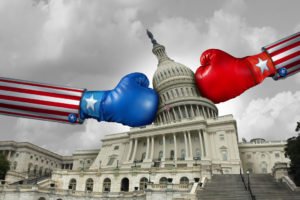Texas Gov. Greg Abbott (R) this week called for a ban on raising property taxes in any city that cuts police department funding, assailing plans to reduce police budgets as a threat to public safety.
“Cities that endanger residents by defunding law enforcement should not be able to get more property tax dollars from those same residents whose lives the city just endangered,” Abbott said at a news conference Tuesday in Fort Worth.
Abbott’s announcement came nearly a week after Austin’s city council voted to slash its police budget by $21.5 million, and as cities across the nation, responding to the widespread protests that followed George Floyd’s death in Minneapolis, are being pressed to reevaluate the role of police.
Since Floyd’s death in May, protesters have repeatedly taken to streets across the country to denounce policing tactics, and many activists have called for police department funding to be cut and money shifted to social services. Abbott’s proposal sets up a possible clash between local and state officials in Texas on an issue that has tormented city councils nationwide this summer. He announced the idea Tuesday while joined by Lt. Gov. Dan Patrick (R), Texas House Speaker Dennis Bonnen (R) and Fort Worth Mayor Betsy Price (R).
“They will never be able to increase property tax revenue again if they defund police,” Abbott said.
However, Abbott’s office has not released details about his plan and did not respond to requests for comment Wednesday. That leaves some specifics of the idea unclear, including what would constitute “defunding.”
“You’d have to define what you are calling a cut,” said Sherri Greenberg, professor of practice at the University of Texas at Austin’s Lyndon B. Johnson School of Public Affairs. “If you transfer money to another department, is that a cut? I don’t know. We haven’t seen the legislation yet.”
The Republican-controlled legislature would need to approve the plan when it reconvenes in January, and the proposal’s success will hinge on the November election as Democrats vie to flip Republican-held seats in the House.
Top state Republicans have thus far supported the governor’s move to crack down on cities.
“Of course the Texas House will 100 percent support this legislation,” Bonnen said at the news conference. “Law enforcement is not of a tool of political agendas, and I would ask the city of Austin to quit using them as one.”
But many Democrats denounced the proposal, signaling that if the bill comes to the House floor in January, votes could split along party lines.
“It is a non-starter,” tweeted state Rep. Eddie Rodriguez. “This is not about police budgets. . . . This is about insipid State overreach into Texans’ right to local government.”
Austin Mayor Steve Adler (D) said he was not told of the proposed legislation ahead of time.
“The news conference today was not about facts. It presented no plans; it presented no data. It was about trying to make us scared,” Adler said at a separate news conference Tuesday. “I’m sure we’re going to see more and more of this as we get closer to the election in November.”
Adler defended the city council’s move to cut Austin’s police budget, calling it a “haircut,” not a gut job.
“It’s important to note that we did not lay off any officers. There was no detrimental impact on emergency response,” he said. “We did not cut $150 million dollars’ of police functions.”
Instead, the mayor said the cuts eliminate funding from planned cadet classes. The city said it would also decouple nearly $80 million, separating police duties from civilian functions such as forensics, administrative services and internal affairs. Around $50 million dollars would be set aside in a fund that focuses on reimagining policing Austin.
Abbott’s proposal comes as other government officials across the country are confronting the defunding debate. President Trump has repeatedly invoked the defunding debate to assail Democrats.
Attorney General William P. Barr on Wednesday again sought to link a recent uptick in homicides in some major cities to protests against police, saying the increase could be due to multiple factors, among them “pent-up aggression” caused by quarantine orders and “efforts that we’ve recently seen to demonize police and to defund their work.”
Barr was speaking at an event in Kansas City, Mo., for “Operation Legend,” a Justice Department effort to send federal law enforcement officials into cities to help local authorities combat violent crime.
“Rather than demonizing and defunding our police, we are supporting and strengthening our law enforcement partners,” Barr said at the event.
Other cities have sought to rethink their police funding in response to extended protests that began this summer, but the debate over what policing should look like has played out in sharply different ways.
After the Seattle city council approved eliminating about $3 million from the city’s police force and reducing its size, Carmen Best, the police chief, announced last week that she would retire.
In Minneapolis, efforts to disband the city’s police department entirely remain essentially stalled for the time being. Last month, the city council there approved moving about $1.1 million from the police budget into a violence-prevention office.
In Omaha, the city council this week declined to move $2 million from the city’s police budget. Still, other places have approved cuts, albeit smaller than those sought by demonstrators. The Los Angeles city council agreed to take $150 million from the police department’s $1.1 billion budget.
Other local officials, meanwhile, opted to approve more funding for police, including in Boise, Idaho, where the city council has moved to increase its police budget.
This has been echoed in some places in Texas, where other big cities have not followed Austin’s lead in seeking to reduce their police budgets. In Houston, the city approved increasing the department’s budget not long after Floyd’s death set off protests. A proposal in Dallas calls for police funding to remain steady next year, while another in San Antonio would also increase police funding.
Policing issues will probably come up again with the Lone Star State’s lawmakers. The Black Legislative Caucus, in partnership with Floyd’s family, announced last week that it would introduce the George Floyd Act, a bill that would ban chokeholds statewide and narrow use-of-force rules.





